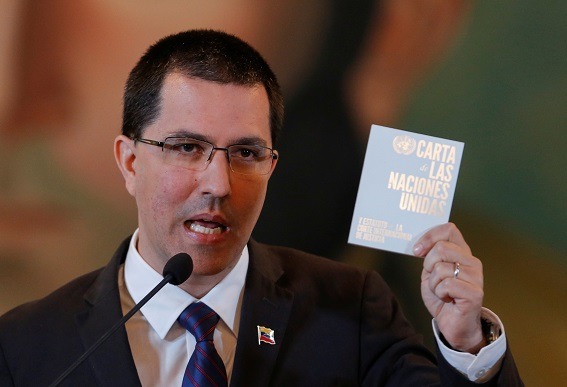Since the onset of Venezuela’s political crisis this year, the U.S. has imposed sanctions on more than 100 individuals and entities, including state-owned oil company Petróleos de Venezuela SA, the Venezuelan Development Bank and Venezuela’s central bank. The new move threatens to target and impose sanctions on virtually any company or individual, foreign or American, that engages in business or offers support to anyone affiliated with the Maduro government.
The Trump administration has worked to rally countries around the world to isolate the Maduro regime as a means of forcing him from power. But several countries, including Russia, China and Turkey, still support the embattled leader.
John Bolton, the US national security adviser who is the mainstay of the new sanctions against Venezuela, on Tuesday at the International Conference on Democracy in Venezuela held in Lima, Peru, condemned the support of Russia and China for the Venezuelan incumbent government.
The belligerent figure of the Trump cabinet claimed that as economic sanctions affected the governments of Panama and Nicaragua, this time it would affect Venezuela. The sanctions are similar to US sanctions against Iran, and targeting third-party companies that deal with the Venezuelan government aims not only at these companies but also at banks, insurance companies and other companies they are in contact with.
However, these measures, known as secondary sanctions, aren’t certain to work, some analysts said. “Secondary sanctions would be significant, depriving the regime of desperately needed oil and gold revenue,” said Benjamin Gedan, who was an Obama administration Latin America adviser. “But it’s far from clear Venezuela’s allies would comply with secondary sanctions,” said Mr Gedan, currently an adviser with the Wilson Center, a Washington think tank. “The White House is having a tough time enforcing Iran sanctions, after all. For Venezuela sanctions, even allies that share the U.S. position, such as the Europeans and Latin Americans, have not coordinated sanctions policy.”
Similar embargoes on Iran and Cuba haven’t deterred the Chinese, Russians and others from doing business with those countries, experts said. Outside observers also warn that sweeping sanctions and secondary sanctions on Venezuela could exacerbate the economic crisis but will make the Venezuelan people stronger in their support for the government.
The action the US is set to take grants some 21 exemptions to international and non-governmental organizations for services such as humanitarian goods, mail, food, medicine and the internet.
“The administration hasn’t been very good at dedicating financial lines that would allow the purchase of food and medicine in sanctioned countries,” said Jeffrey Schott, an economic-sanctions expert at the Peterson Institute for International Economics, a Washington think tank. “In practice, we still block food and medicine because the parties in the targeted regime that want to import it can’t get financing.”
The new sanction imposed by the Donald Trump administration is the latest in a series of “arbitrary measures of economic terrorism against the Venezuelan people,” the Foreign Affairs Ministry said in a statement. “Washington has issued another executive order that aims to formalize the criminal economic, financial and trade embargo already underway, which has caused severe harm to Venezuelan society in recent years,” the ministry said. Meantime, Venezuela’s deputy minister of international relations condemned the US move as “international piracy”.
Konstantin Kosachev, the head of the Russian upper house’s international affairs committee, said the move amounts to “international banditry”. He added that it represents “open meddling into Venezuela’s internal affairs”.










0 Comments